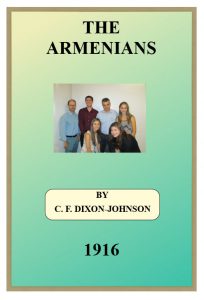THE FOLLOWING PAGES were first read as a paper before the “Société d’Etudes Ethnographiques.”They have since been amplified and are now being published at the request of a number of friends, who believe that the public should have an opportunity of judging whether or not “the Armenian Question” has another side than that which has been recently so assiduously promulgated throughout the Western World.
Though the championship of Greek, Bulgarian and other similar “Christian, civilized methods of fighting,” as contrasted with “Moslem atrocities” in the Balkans and Asia Minor, has been so strenuously undertaken by Lord Bryce and others, the more recent developments in the Near East may perhaps already have opened the eyes of a great many thinking people to the realization that, in sacrificing the traditional friendship of the Turk to all this more or less sectarian clamour, British diplomacy has really done nothing better than to exchange the solid and advantageous reality for a most elusive and unreliable, if not positively dangerous, set of shadows.
It seems illogical that the same party which recalled the officials (and among them our present War Minister) appointed by Lord Beaconsfield to assist the Turkish Government in reforming their administration and collecting the revenue in Asia Minor, and which on the advent of the Young Turks refused to lend British Administrators to whom ample and plenary powers were assured, should now, in its eagerness to vilify the Turk, lose sight of their own mistakes which have led in the main to the conditions of which it complains, and should so utterly condemn its own former policy.
Whatever hardships the Armenians may within recent years have suffered, the responsibility for them must surely to a great extent rest with the well-meaning idealists who, instead of trying to improve existing conditions, inspired their helpless dupes with impracticable aspirations which were bound to lead to disaster.
The writer desires to thank those authors and travellers whose works he has so freely quoted, and upon whose information he has relied for the historical and geographical notes, as well as Professor Henry Leon, Mr. Robert Fraser, and other friends, who have afforded him their most valuable assistance.
The reasons for dealing with the subject at this particular juncture are given in the text and will, he hopes, prove satisfactory to the reader.
